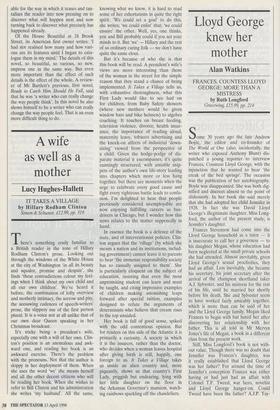Different sides of the counter culture
Francis King
MR CLIVE AND MR PAGE by Neil Bartlett Serpent's Tail, £9.99, pp. 207 The season, as we almost immediately discover, is Christmas. The year, as we dis- cover more slowly in a book which teasing- ly withholds its information in order to give it an even more jolting force when at last it is released, is 1956. A demure, highly respectable, middle-aged, homosexual, Sel- fridges shop-assistant returns to his north London flat, as cramped as his life, first to get into the silk dressing-gown, with its hand-rolled butter-yellow piping, which he has just bought at huge expense in Jermyn Street, and then to embark on the task of writing about a life of fear, subterfuge and occasional moments of overwhelming hap- piness or high drama in the days when even between consenting adults in private homosexual intercourse of any kind was a criminal offence.
This shop-assistant protagonist, the Mr Page of the title, writes at one moment of `people on different sides of the counter'. But even more than the social chasm sepa- rating him from his unlikely friend Mr Clive, the sexual chasm between the 'gay' and the 'straight' provides the dominant theme of Neil Bartlett's often surprising and always arresting novel. At this period, what is now called 'the gay community' is still a hermetic one, protected from the terrors of the law by a carapace fashioned out of innumerable shibboleths, disguises and reticences.
Mr Clive and Mr Page, so similar in appearance, both homosexuals and both, at the time of their meeting outside the once famous (or notorious) Jermyn Street Turkish baths, approaching their 21st birthdays on exactly the same day, might be taken for twins. But Mr Clive's class and financial circumstances are far superior to those of Mr Page, since he is heir both to a fortune, all too soon to be frittered away, and to a Nineties House Beautiful (bril- liantly described in all its suffocatingly opulent detail of Morris & Company fur- nishings, Tiffany light fixtures and dark rose African marble) in Brook Street. Close to this 'Romanesque' mansion is the no less opulent Bouwens-decorated office, later to become the premises of the Savile Club, in which 'Lulu' Harcourt, eventually driven to suicide by the adolescent Edward James's accusation that he attempted to seduce him, lived when in London. Since, like Peter Ackroyd, Bartlett is a writer who is constantly prepared to divert facts to his fictional purpose, the suicide of Harcourt in this house rather than (as in real life) at Nuneham Courtney is an episode which provides a glacial undercurrent of fear to the lives of the two men and of many like them.
Faced both with the certainty of finan- cial ruin because of his extravagance and with the possibility of social ruin because of his love-affair with an 18-year-old, silvery- haired manservant whom he has imported from Riga, Mr Clive engineers his and the boy's disappearance in a fashion which it would spoil the intensely dramatic impact of the book to reveal. For Mr Page, himself infatuated with the boy, no such disappear- ance is possible. He is doomed to a life of continuing apprehension and pretence.
Twice in the course of his life a shared sexuality demolishes for Mr Page that invis- ible 'counter' to which he has alluded. First, there is his relationship with Mr Clive, so distant from him in class, educa- tion and financial circumstances and yet so close to him in all that is essential in their natures. Secondly, in 1952, he is ordered to leave the Jermyn Street baths when the attendant on duty realises that he and another customer, 'a 6ft 4ins beefcake star', in London to be presented to the Queen at a film premiere, have been attempting to pick each other up. The film-star, then only twenty-four, is Rock Hudson.
In its mixing, as here, of fact and fiction, and in its constant shuttling between 1956 and 1924, between homosexuality and heterosexuality, between the depiction of glittering and defiant wealth and of drab and docile indigence, this is a book remark- able for the way in which it teases and tan- talises the reader into now pressing on to discover what will happen next and now turning back to discover what precisely has happened already.
Of the House Beautiful at 18 Brook Street, its American first owner writes: 'I had not realised how many and how vari- ous are its features until I began to cata- logue them in my mind.' The details of this novel, so beautiful, so various, so new, impress one in the same way. But even more important than the effect of such details is the effect of the whole. A review- er of Mr Bartlett's previous, first novel, Ready to Catch Him Should He Fall, said that he was 'a writer who can really change the way people think'. In this novel he also shows himself to be a writer who can really change the way people feel. That is an even more difficult thing to do.



































































 Previous page
Previous page